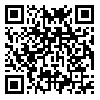Volume 16, Issue 57 (4-2022)
MLJ 2022, 16(57): 305-320 |
Back to browse issues page
Download citation:
BibTeX | RIS | EndNote | Medlars | ProCite | Reference Manager | RefWorks
Send citation to:



BibTeX | RIS | EndNote | Medlars | ProCite | Reference Manager | RefWorks
Send citation to:
Alimoradi Z, Fallah M J, Avatefi Z. Principles of World Health Ethics for Medical Students in Islamic Teachings. MLJ 2022; 16 (57) :305-320
URL: http://ijmedicallaw.ir/article-1-1204-en.html
URL: http://ijmedicallaw.ir/article-1-1204-en.html
1- Department of Familiarity with Islamic Sources, Faculty of Islamic Education and Thought, University of Tehran, Tehran, Iran
2- Department of Education, Faculty of Islamic Ethics, University of Islamic Education, Qom, Iran
2- Department of Education, Faculty of Islamic Ethics, University of Islamic Education, Qom, Iran
Abstract:
Background and Aim: By presenting some ethical principles, health ethics has always tried to put ethical decisions between the patient and the therapist in a systematic way. Some of these principles, known as traditional principles, include justice, harmlessness, usefulness, and individual independence. Health ethics is fragmented in response to some ethical challenges. Therefore, researchers of Islamic ethics must study the answers to Islamic ethics, its arguments, and its principles.
Method: This research is theoretical and the research method is descriptive and analytical. The method of collecting information is in the form of a library and referring to documents, books and articles.
Ethical Considerations: In all stages of writing, while respecting the originality of the texts, honesty and trustworthiness have been observed.
Results: The therapist should provide equal services to patients regardless of economic, social, religious and gender status (justice). Also, following the principle of respect for human self-ownership, the patient should be properly informed about the treatment process (individual independence), so that no harm is done to the therapist and the patient (non-maleficence) and both are beneficial in this regard. These cases can be studied from Islamic teachings and can be understood, confirmed and emphasized from the point of view of the manners of the wise.
Conclusion: In response to the ethical challenge in the principle of independence, the ethics of universal health in individualistic and conscientious schools is a difference of opinion. But Islamic ethics, citing the divine trustworthiness of the body as well as the sanctity of self-murder, does not allow the denial of individualism and wrong treatment, even at the request of the patient. In the conflict between personal harm and public health, the utilitarian moral school allows the public interest to be won, even at the cost of harm to the individual, but Islamic ethics, by justifying and unjustified harm, also prioritizes otherworldly health over worldly health. The health of one’s religion precedes the absolute health of society, and if this issue is not observed, unjustified harm will be caused to the person. In the moral challenge to the principle of utility, where the benefit of the non-possessive patient is owed to the patient owed to the other, the Bentham utilitarian school, unlike the conscientious moral school, accepts the moral justification of this precedence. Islamic ethics in preferring to save the patient's life does not take into account his benefit to society, because saving one person is the salvation of all human beings.
Please cite this article as:
Alimoradi Z, Fallah MJ, Avatefi Z. Principles of World Health Ethics for Medical Students in Islamic Teachings. Medical Law Journal. 2022; 16(57): e21.
Method: This research is theoretical and the research method is descriptive and analytical. The method of collecting information is in the form of a library and referring to documents, books and articles.
Ethical Considerations: In all stages of writing, while respecting the originality of the texts, honesty and trustworthiness have been observed.
Results: The therapist should provide equal services to patients regardless of economic, social, religious and gender status (justice). Also, following the principle of respect for human self-ownership, the patient should be properly informed about the treatment process (individual independence), so that no harm is done to the therapist and the patient (non-maleficence) and both are beneficial in this regard. These cases can be studied from Islamic teachings and can be understood, confirmed and emphasized from the point of view of the manners of the wise.
Conclusion: In response to the ethical challenge in the principle of independence, the ethics of universal health in individualistic and conscientious schools is a difference of opinion. But Islamic ethics, citing the divine trustworthiness of the body as well as the sanctity of self-murder, does not allow the denial of individualism and wrong treatment, even at the request of the patient. In the conflict between personal harm and public health, the utilitarian moral school allows the public interest to be won, even at the cost of harm to the individual, but Islamic ethics, by justifying and unjustified harm, also prioritizes otherworldly health over worldly health. The health of one’s religion precedes the absolute health of society, and if this issue is not observed, unjustified harm will be caused to the person. In the moral challenge to the principle of utility, where the benefit of the non-possessive patient is owed to the patient owed to the other, the Bentham utilitarian school, unlike the conscientious moral school, accepts the moral justification of this precedence. Islamic ethics in preferring to save the patient's life does not take into account his benefit to society, because saving one person is the salvation of all human beings.
Please cite this article as:
Alimoradi Z, Fallah MJ, Avatefi Z. Principles of World Health Ethics for Medical Students in Islamic Teachings. Medical Law Journal. 2022; 16(57): e21.
Type of Study: Original Article |
Received: 2020/09/3 | Accepted: 2021/09/5
Received: 2020/09/3 | Accepted: 2021/09/5
Send email to the article author
| Rights and permissions | |
 |
This work is licensed under a Creative Commons Attribution-NonCommercial 4.0 International License. |






